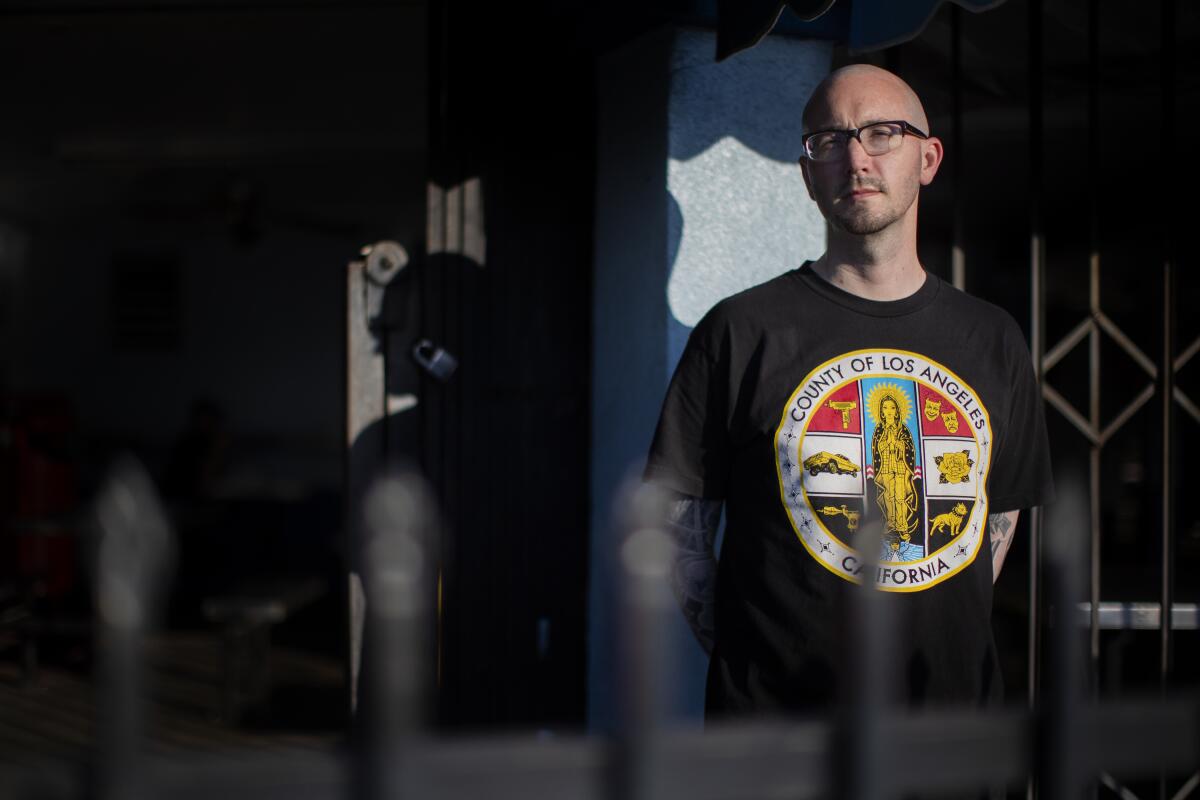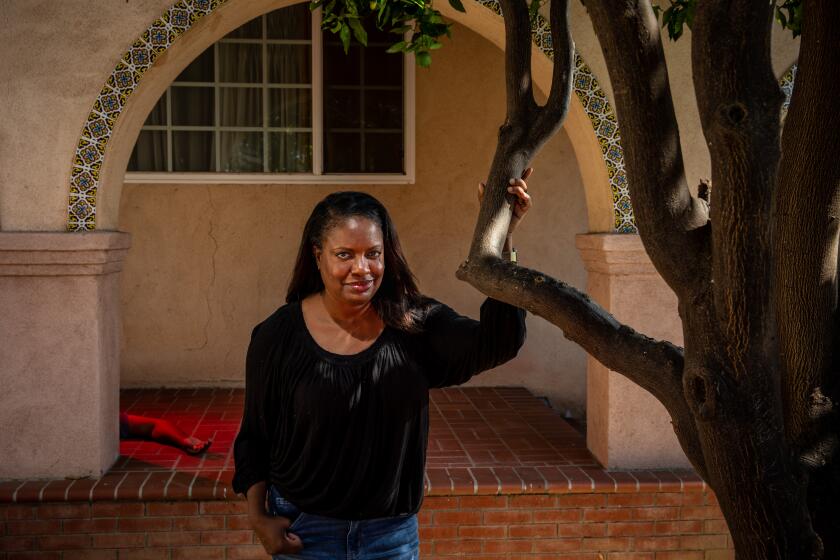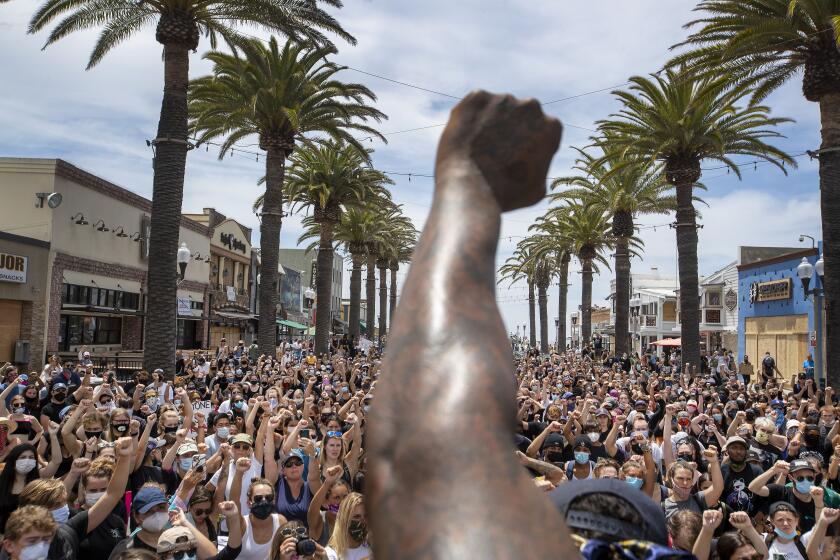How an outsider novelist nailed ‘The System’ of crime and punishment in South L.A.

- Share via
On the Shelf
The System
By Ryan Gattis
MCD/FSG: 432 pages, $28
If you buy books linked on our site, The Times may earn a commission from Bookshop.org, whose fees support independent bookstores.
There are so many subgenres of crime fiction, all with their own traditions and tropes, that mastering any one of them could entail a lifetime of writing. But in “The System,” Ryan Gattis seems to capture the lion’s share of them. His fifth novel powerfully illuminates every corner of the law-and-order universe — from drive-by shootings to cops to courts, from corrections officers to parole agents and beyond. In unfurling the aftermath of a gang-related shooting, he builds a bridge of understanding — even for readers who think this might not be their kind of book — to a system that impacts us all.
It’s the kind of command performance that makes you want to talk to the author — to explore the San Pedro resident’s immersive storytelling style, hear his overarching ideas about the criminal justice system and find out how a military kid from Colorado wound up with such kaleidoscopic knowledge of South L.A.’s street life (and its food).
Like “The System,” it’s quite a story. Gattis, 42, was born on an Air Force base in Southern Illinois into a military family, which moved shortly thereafter to Colorado Springs, Colo. Ryan and his brother were expected to become officers as well, which meant ticking off a series of academic, athletic and extracurricular boxes in high school. But in his junior year, Gattis was brutally attacked by an acquaintance, depriving him of the ability to taste or smell for more than a year. (More on the attack appears in an essay on his website.) While recuperating from two facial-reconstruction surgeries, he became engrossed in literature, film and art.
Crime novelist Ryan Gattis lost his sense of taste for a year and emerged obsessed with food. He writes about 6 spots in L.A. that feature in “The System.”
“In some small way,” says Gattis, “I think that experience really did make me a writer. I found it so much easier to connect with art and through art after what had happened to me.” Listening to Gattis unspool the story, sounding more thoughtful than aggrieved, it’s clear the incident also made him a keen observer of the people around him, from the assistant coach who was more concerned that day about Gattis’ blood making a mess on the floor to the classmates who came to his aid, almost all Black and brown.
Creative writing became his calling. Gattis got his BFA at Chapman University in Orange County and, after earning an MFA in England, returned to teach creative writing at his alma mater. Early on, a friend introduced him to a member of ULGARworks, an L.A.-based art collective that made commissioned murals across the region. Several members of the group had admired his second novel, “Kung Fu High School,” and Gattis became the only member of the collective who is a writer. It was on an assignment in Lynwood that Gattis discovered the city that would become a setting for his third novel, “All Involved,” which takes place in the days following the 1992 uprising.
On April 29, 1992, violence erupted throughout Los Angeles in the wake of the Rodney King verdict: A jury had failed to convict four white LAPD officers in the beating of African American motorist King, despite the incident having been captured on video.
“The System” is set about 18 months later; it follows the L.A. Sheriff’s Department’s investigation of the shooting of drug dealer Lucrecia “Scrappy” Lucero in front of her mother’s Lynwood home. Scrappy is saved at the scene by Augie Clark, a former Navy medic. Augie witnesses the crime while attempting to score heroin, tourniquets Scrappy’s wounded leg and makes off with the gun and drugs hidden in her clothing. Later busted by parole agent Phillip Petrillo, Augie fingers two gang members, Omar “Wizard” Tavira and Jacob “Dreamer” Safulu, for Scrappy’s shooting. But only one of them is guilty.
Following the case against Wizard and Dreamer, Gattis exposes readers to details rarely portrayed in fiction — the unwritten rules of gang culture, the judicial system and the carceral process — that only an insider could weave in so seamlessly. It was a world Gattis didn’t know before writing “All Involved.” He only had the germ of an idea for a novel involving the aftermath of a crime when, through connections he made through ULGARworks, he met with a former gang leader in Lynwood. Gattis’ honesty about his violent experience sparked a connection, which later helped the writer portray that world with an insider’s knowledge — even as his outsider’s perspective fed into fish-out-of-water characters that draw readers in.
For “The System,” Gattis spent six years interviewing LASD detectives, parole officers, public defenders and prosecutors — as well as gang members like Wizard and Dreamer whom Gattis met while researching “All Involved” and teaching writing to prisoners for PEN America. He also made several trips to places like the Men’s Central Jail in downtown L.A. and North County Correctional Facility in Castaic.
“I know maybe I’m slightly odd as a writer, but I just need to stand somewhere,” Gattis says. “I need to feel the energy of a place, smell it, observe the light, look for potential hazards or obstructions or things that might genuinely matter to my characters.” He’s referring to one of the more quietly powerful yet cinematic scenes in the novel, when Dreamer, who’s never been arrested before, takes in the view from the rooftop exercise yard at Men’s Central. “I hear the city all around us,” Dreamer observes. “A long, mad train from Union Station that fades off as it goes. I feel like it’s going north. Or maybe I just want it to…”
Dreamer, a Samoan teen in way over his head, is one of two outsiders — among 12 first-person narrators skillfully woven into the novel — whose singular perspectives make “The System” both accessible and irresistible. “While in custody,” Gattis writes in the opening pages, “your body is not your own. It belongs to the county.”
Rachel Howzell Hall’s new novel, “And Now She’s Gone,” breaks the crime-fiction mold; its success proves a long line of publishers wrong.
The second outsider is Jeovanni Matta, a teenager determined to find out why his best friend was framed for Scrappy’s shooting. As a gay Guatemalan, Jeovanni is on the awkward periphery of testosterone-fueled gang life. But the young man’s book smarts impress Wizard, who tasks him with discovering who’s out to tag them for attempted murder. In the process, Jeovanni uncovers an all-too-plausible conspiracy. To say more would spoil the satisfaction of watching Jeovanni make discoveries about both the crime and his own attraction to power.
It’s all a part of something larger that Gattis seeks to expose, which brings us back to the novel’s title. “I had two goals in mind,” Gattis says. “The first was to humanize the criminal justice system by giving the reader deep and genuine access to the folks who will determine the outcome of the eventual trial. That includes the professionals — law enforcement, prosecution and defense lawyers. My second goal was to show how the system actually works.”
For legal details, he relied on another personal connection; he’s married to a criminal attorney in the office of the L.A. County D.A. Asked if that made writing the trial scenes in “The System” any easier, he laughs before admitting, “Writing [prosecutor Kristina Mirkovich] helped me respect and appreciate my wife’s mind even more. I found it fun to anticipate and structure Kristina’s legal arguments, strategy and line of questioning. And then there would be moments where my wife would read it and tell me, ‘No, that’s not how that works!’ It’s that pushback from her and other genuine professionals that makes my writing the best it can be.” He also borrowed his wife’s Croatian heritage for Kristina, adding texture to the dialogue and a scene set in a Croatian restaurant in San Pedro.
Restaurants are frequent settings in “The System” — from San Pedro to Long Beach to Lynwood — reflecting a lifelong love of diverse food cultures that emerged after he regained his sense of smell and taste (see sidebar).
It speaks as well to Gattis’ empathy for people across the spectrum of race, class and ethnicity. Whether the novel’s characters are held to account for their misdeeds or trying to better their lives, the criminal justice system impacts them all. About two of the novel’s strivers, Gattis says, “I think the important thing is they are bound by wanting something good and right. And [coming] free of the relentless cost of street justice and what it requires.”
Walter Mosley, Luis Rodriguez, the coiner of #BlackLivesMatter and others sketch a hopeful future for L.A. and the U.S. after George Floyd protests.
It’s that focus on the hidden stories — the stakes for each of his many characters — that makes “The System” truly stand out. It’s a reminder that, no matter how complex the system, what matters is the people it’s meant to serve.
Woods is a book critic, editor of anthologies and author of the Detective Charlotte Justice procedurals.
More to Read
Sign up for our Book Club newsletter
Get the latest news, events and more from the Los Angeles Times Book Club, and help us get L.A. reading and talking.
You may occasionally receive promotional content from the Los Angeles Times.











